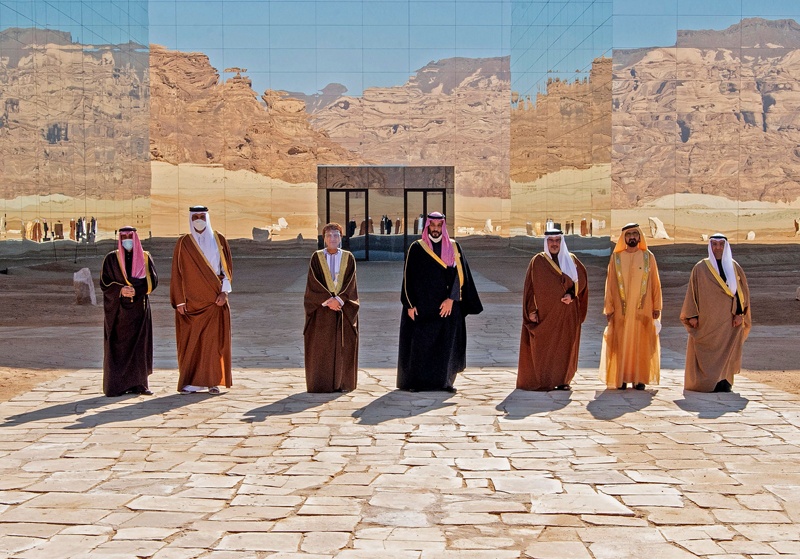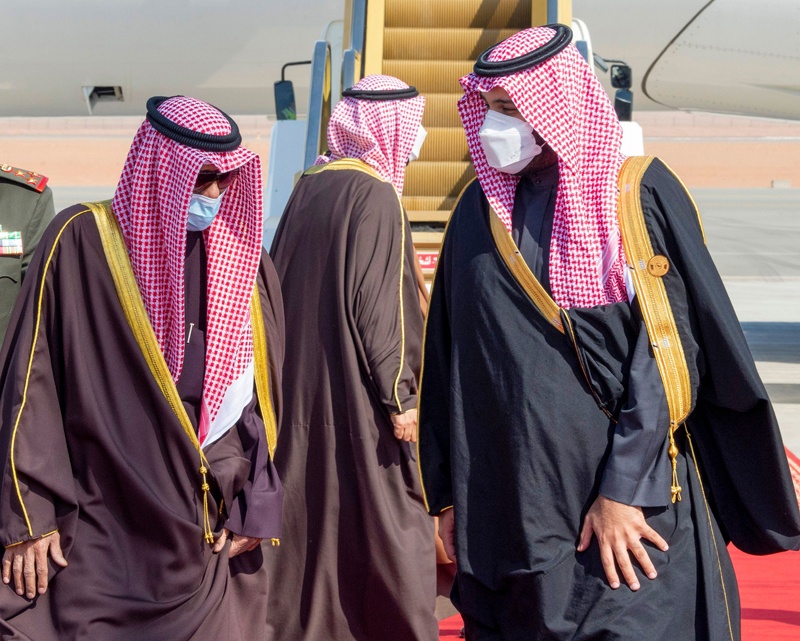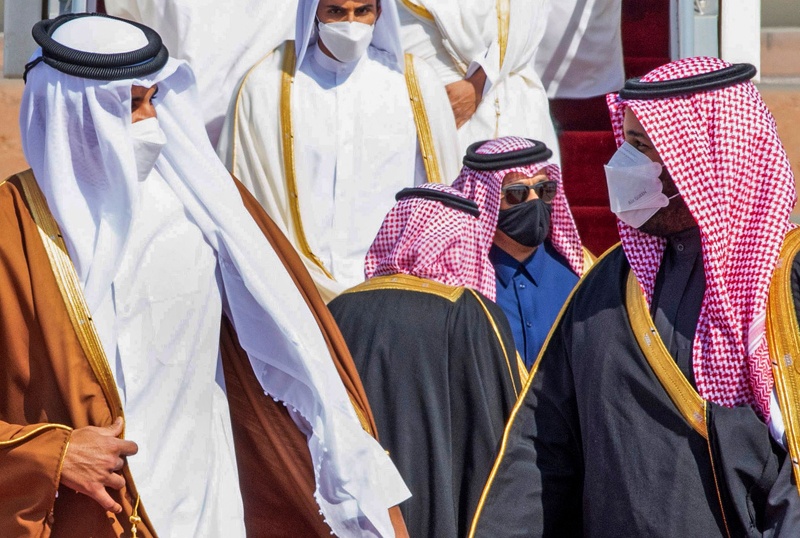
AL-ULA, Saudi Arabia: Gulf leaders signed a "solidarity and stability" deal yesterday after the leaders of Saudi Arabia and Qatar publicly embraced, bringing Doha back into the regional fold after a three-year rift. Saudi Arabia had led a coalition of countries in the Gulf and beyond to cut ties and transport links with Qatar in June 2017, charging that it was too close to Iran and backed radical Islamist groups - allegations Doha denied.
Those countries, along with Oman and Kuwait which have mediated between the two sides, signed a rapprochement deal in the Saudi city of Al-Ula, after Riyadh overnight re-opened its land, sea and air borders to Doha. Saudi foreign minister later said full ties have been restored between Qatar and the four nations that had severed relations with Doha. "What happened today is… the closure of the folder of all points of difference and a full return of diplomatic relations," Prince Faisal bin Farhan told a press conference at the conclusion of the landmark regional summit.
HH the Amir of Kuwait Sheikh Nawaf Al-Ahmad Al-Jaber Al-Sabah congratulated GCC leaders for concluding the Al-Ula Declaration, which "reminds us of huge endeavors" late Amir HH Sheikh Sabah Al-Ahmad Al-Sabah made to make this declaration possible. "As I congratulate you on this historic achievement, the signing of Al-Ula Declaration, we remember the faithful and constructive role of His Highness the late Sheikh Sabah Al-Ahmad Al-Jaber Al-Sabah … who hugely contributed to the success of this agreement," HH the Amir said in a speech.
The Amir also thanked US President Donald Trump and his advisor Jared Kushner for contributing to the "noble objective" and concluding the agreement. He appreciated keenness of the leaders of the GCC and Egypt to exert further efforts to achieve aspirations of the people. "Calling our declaration the solidarity agreement reflects our keenness and conviction in its importance, and it reflects on the other hand our conviction that restoring it is a continuation of our desire for unity of our Arab nation," he said.
HH the Amir expressed gratitude to the Saudi King and his government for naming the Summit the summit of "Sultan Qaboos and Sheikh Sabah" in appreciation of the two Gulf leaders' service of Arab and Islamic causes. Sheikh Nawaf also thanked King Salman bin Abdulaziz, his government and people for hosting the GCC summit, welcomed Egyptian Foreign Minister Sameh Shukri and commended Cairo's support for the security and stability of the region. He also welcomed Arab League Secretary General Ahmad Abul Gheit and Secretary General of the Organization of Islamic Cooperation (OIC) Yusuf Al-Othaimeen.
"There is a desperate need today to unite our efforts to promote our region and to confront challenges that surround us, especially the threats posed by the Iranian regime's nuclear and ballistic missile program and its plans for sabotage and destruction," said Saudi Crown Prince Mohammed bin Salman. The Al-Ula Declaration "affirms our Gulf, Arab and Islamic solidarity and stability", he told the meeting, in comments echoed by other leaders.
The details of the agreement were not immediately released. But the warm welcome Prince Mohammed extended to Qatar's ruler Sheikh Tamim bin Hamad Al-Thani, with the pair embracing at the airport and then chatting animatedly, indicates a significant breakthrough.
Sheikh Tamim, visiting Saudi for the first time since the crisis began, was whisked with the other leaders through Al-Ula's dramatic Martian landscape to the shimmering Maraya Concert Hall, a mirrored structure situated in a nearby valley. Later, Saudi state media tweeted a photo of the young Saudi leader behind the wheel of his sports utility vehicle, taking Sheikh Tamim on a tour of the area.
Saudi state media said Prince Mohammed met separately with Sheikh Tamim after the pair publicly embraced at the airport. "During the meeting, they reviewed bilateral relations between the two brotherly countries and ways of consolidating the Gulf Cooperation Council joint action," the official Saudi Press Agency said.
"These are first steps or a first phase of reconciliation that will be followed by other steps. Some may belittle that progress, but resuming open direct communication and avoiding verbal attacks is progress," said Kuwait University assistant professor Bader Al-Saif. "The other states… will follow suit and pursue similar reconciliatory steps."
Saudi commentators appeared on Doha-based broadcaster Al Jazeera for the first time in years, and a major Saudi media group deleted the song "Teach Qatar" - which details its supposed failings -from its YouTube channel. "It is amusing to see so many analysts and journalists try to pour cold water over this important development," tweeted author and commentator Ali Shihabi. "Understandable since the gravy train of funding for many of them will likely end. A whole industry had emerged to take advantage of this split and that will dry up."
Washington had intensified pressure for a resolution to what Doha calls a "blockade", insisting Gulf unity is necessary to isolate US foe Iran as the curtain falls on Trump's presidency. Kushner, Trump's son-in-law and senior adviser who shuttled around the region to seek a deal, attended the signing in Al-Ula. "The Trump administration will claim this as another victory for sure," said Royal United Services Institute analyst Tobias Borck.
Kuwaiti Foreign Minister Sheikh Ahmad Nasser Al-Mohammad Al-Sabah announced on state television Monday that an agreement had been struck to open all the borders between Saudi and Qatar with immediate effect. Drivers south of Doha on the usually calm Salwa highway towards the Saudi border at Abu Samra sounded their horns and waved their arms from their car windows in the wake of the announcement, an AFP correspondent reported.
"We will see all Saudis here, also all Qataris will visit Saudi Arabia, and we will be friends as we were before and better," said Hisham Al-Hashmi, a Qatari with an Emirati mother, who wore a traditional thobe and winter headdress. Saudi media, which is influential throughout the region, quickly adopted a tone in stark contrast to past coverage of Qatar which had focused on past transgressions and alleged crimes, instead talking about "unity" and "fraternity".
The Saudi-led GCC hawks, along with Egypt, in 2017 closed their airspace to Qatari planes, sealed their borders and ports, and expelled Qatari citizens. An information battle raged online with the two camps trading barbs, deepening the resentments. However, Prime Minister Sheikh Mohammed bin Rashid Al-Maktoum, who is also the ruler of Dubai, said the summit had brought unity to the region. "The changes and challenges surrounding us require strength, cohesion and real Gulf cooperation," he tweeted. - Agencies






